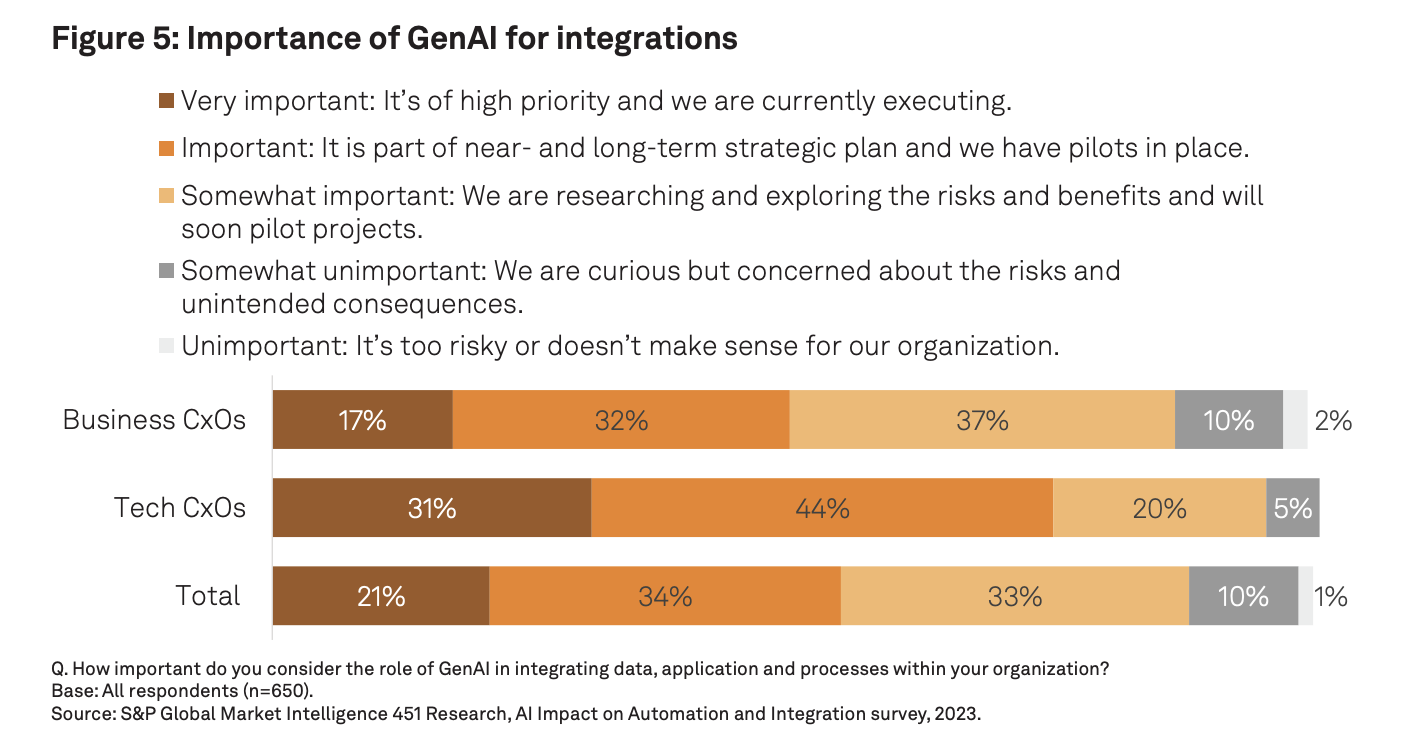If you’re an IT or business leader, you know that generative AI (GenAI) is the biggest story in tech. Since the launch of ChatGPT in November 2022, GenAI has captured imaginations, reworked product and service development plans, and landed very high on the priority list of nearly every CEO.
But amid all this excitement, you might be wondering:
- Do other business and IT leaders trust GenAI? Or are they taking a cautious, wait-and-see approach before investing in it?
- Are businesses really adopting GenAI for use cases other than chatbots and voice recognition — use cases that have been around for a long time?
- How useful is GenAI for core IT architecture projects such as integration and automation?
This last question is doubly important. Integration and automation are foundational capabilities for the digital transformation initiatives that organizations have been working on for the past decade. IT and business leaders know they need to do away with data silos and manual processes. They know they need to connect people, applications, and data across their organizations, eliminate manual processes, reduce costs, and enable the delivery of fast, frictionless experiences for customers, partners, and employees.
Businesses need to do all these things, with or without GenAI. After all, GenAI on its own doesn’t suddenly solve communication breakdowns between business units or deliver logistics data to your new mobile app. You need integration and automation to do those things.
And integration and automation turn out to be critical for GenAI, too. Like all forms of AI, GenAI runs on data. If organizations don’t have access to all their data, or if it’s poorly managed and uneven in quality, then ongoing and future investments in GenAI and other AI technologies will suffer.
So, now that we’re over a year past the dazzling debut of ChatGPT, it’s worth taking the temperature of the IT industry overall regarding GenAI.
Who’s doing what with GenAI? And how confident are they in the results?
New 451 Research Survey Shows Businesses Are Putting GenAI to Work
A new report from leading analyst firm 451 Research answers these questions with hard numbers and some surprising insights.
The discovery report, “The Impact of AI on Enterprise Integration and Automation,” commissioned by Boomi, presents the firm’s findings from a survey of 650 business and IT leaders across of broad range of industries. Analysts questioned these leaders about their attitudes and perceptions regarding GenAI, including GenAI’s use for integration and automation.
The findings?
The vast majority of business and IT leaders are moving ahead with GenAI initiatives. Their confidence in GenAI is high. And many enterprises are already using GenAI for integration and automation.
There’s not enough room in this blog post to go into all the survey findings, so I’ll just touch on a few highlights. (For the full report, register here.)
Leaders Trust GenAI and Are Already Using It
Business and IT leaders’ overall perception of AI is positive:
- 48% of leaders see GenAI as positive and are investing broadly in applications that use it.
- 40% see it as somewhat positive; they see the potential benefits of GenAI and are committed to experimenting with GenAI projects that deliver value.
- Only 6% of leaders somewhat distrust GenAI, and a mere 1% do not trust it at all.
Analysts asked about leaders’ trust more specifically. They discovered that:
- 31% of IT leaders and 17% of business leaders trust GenAI completely for content generation and decision-making — a remarkable amount of trust, given how new some AI platforms and use cases really are.
- 51% of IT leaders and 46% of business leaders trust GenAI somewhat for these use cases.
That trust is reflected in the GenAI projects that are already in production.
- 26% of leaders say their organizations have fully embraced GenAI and that it plays a significant role in most aspects of operations.
- 31% say GenAI is integrated into several key processes and operations.
- 24% say GenAI is being used in specific areas of departments but not across the entire organization.
- Only 20% say that they have experimented with GenAI but not integrated it into core operations.
This is a startling rate of adoption. GenAI was around before ChatGPT, but it wasn’t widely used. Now a quarter of businesses say it plays in a significant role across the organization.
There are several lessons here for IT and business leaders. First, the technology is far enough along that your peers and competitors are putting it to work in everyday operations. Second, your competitors will likely reap the benefits of their GenAI investments. They will become more agile and efficient. Third, if you don’t have a strategy for investing in GenAI, now is the time to put one in place if you don’t want to lose competitive advantage.
Businesses Have Begun Relying on GenAI for Integration and Automation
Integration and automation are of course top of mind for us here at Boomi. The study found widespread enthusiasm for using GenAI to speed and smooth integration, as Figure 5 below, excepted from the report, shows:
- 55% of IT and business leaders believe that GenAI is either “very important” for integrating data, applications, and processes, meaning that this use case is a high priority and that teams are already executing on it — or it’s “important,” meaning that pilot projects are active and GenAI is part of the organization’s near- and long-term strategy plans for integration.
- 33% say it’s “somewhat important,” meaning they are researching its risks and benefits and plan to launch pilot projects soon.

Clearly, businesses recognize the value that GenAI promises teams working on integration and automation. In fact, 43% of respondents says they’re already using some form of an AI-assisted integration platform. (You can learn about the Boomi platform’s AI capabilities here.)
The study’s authors — Carl Lehmann, senior research analyst, and David Immerman, consulting analyst — conclude: “Given the findings of this report, we believe enterprises could benefit from a unified approach to integration and automation that apples GenAI, and other forms of AI, to develop data-driven intelligent process automations.”
To learn more about the report’s finding, including how businesses rank GenAI’s benefit for automation, such as improved accuracy and consistency, cost reduction, and competitive advantage, read the full report here.


 English
English 日本語
日本語